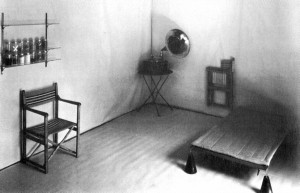Find online now at diploma14.com the extended brief of The Grand Domestic Revolution, Diploma 14′s research for the Academic Year 2013-2014.
While the noun ‘house’ emphasizes the symbolic dimension of the domestic realm, the term ‘housing’ focuses on the functioning of the house – the process of containing subjects bysubtly defining their way of life. In this sense, Le Corbusier gave the most precise definition of housing when he said that the house is a machine à habiter. This definition allows us to understand housing not only as the space of the ‘everyday’ but also as a multifarious apparatus which puts together social, economic, juridical and cultural issues.
This year Diploma 14 will depart from this understanding of housing towards the invention of new forms of domestic space. Once believed to be a place of stability and recovery from the social world of production, housing has become the most uncertain domain, which, more than anything else, reveals the most subjective dimensions of the current economic crisis. As Maurizio Lazzarato has recently argued, the neoliberal economy is a subjective economy that is no longer based – as classical economics was – on the barterer and the producer. A key figure of the neoliberal economy is the ‘indebted man’ – that is, the indebted consumer, the indebted user of the welfare state and, in the case of nation-state debt, the indebted citizen.
Housing in the form of property has played a fundamental role in the making of the indebted man. In light of this system’s failure to ‘take care’ of its subalterns, the time has come to propose alternatives to traditional forms of home-ownership. The question of this year’s unit will be to rethink forms of housing, moving beyond home ownership towards more shareable and collective ways of inhabiting space.
The fundamental focus of the unit will be the idea of domestic space, and how its radical
reform can be understood as an act of political and social imagination.


No comments
Be the first one to leave a comment.